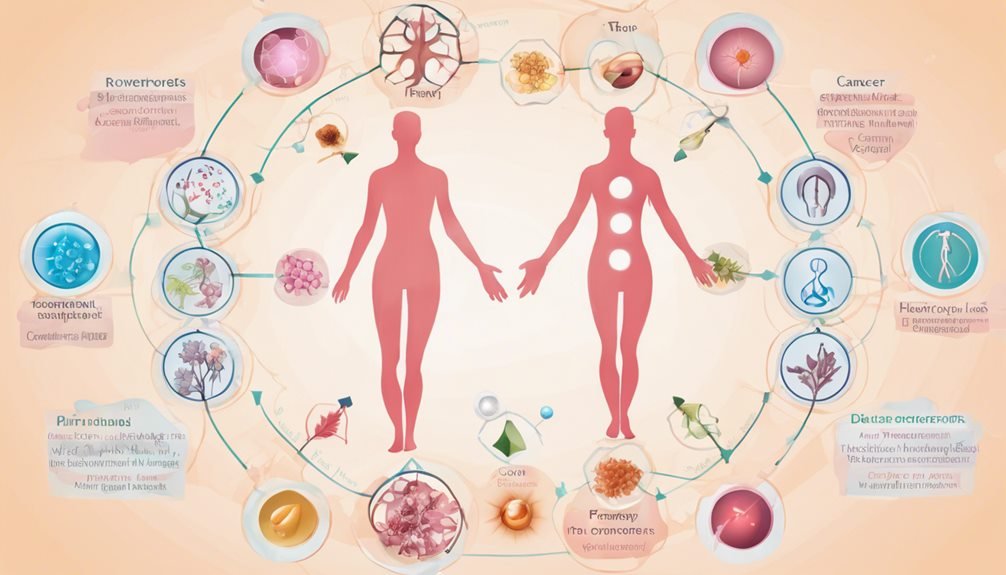When it comes to navigating the complexities of cancer recovery, one aspect often overlooked yet undeniably significant is the natural balancing of hormones. The intricate interplay between hormones and the body's healing mechanisms can be a game-changer in post-cancer treatment. By understanding how hormone balance impacts recovery, you can uncover a vital piece of the puzzle that may hold the key to optimizing your health journey.
Key Takeaways
- Opt for hormone-optimizing foods and herbs.
- Prioritize sleep, stress management, and exercise.
- Avoid hormone disruptors in products.
- Consult healthcare providers for hormone testing.
- Consider natural supplements for balance.
Understanding Hormone Imbalance
If you or a loved one is navigating cancer recovery, understanding hormone imbalance is crucial. Hormone regulation plays a significant role in our overall health, and in the context of cancer recovery, hormone optimization becomes even more pivotal.
Hormones act as messengers in the body, affecting various functions such as metabolism, growth, and mood. In cancer patients, the delicate balance of hormones can be disrupted due to treatments like chemotherapy or hormonal therapies.
When hormone imbalance occurs during cancer recovery, it can lead to a range of symptoms that impact the quality of life. Fatigue, weight changes, mood swings, and disrupted sleep patterns are common signs of hormonal disruption.
Understanding these imbalances and how they can affect your recovery journey is essential. Seeking support from healthcare providers who specialize in hormone optimization can help you navigate this aspect of your recovery more effectively.
Impact of Hormones on Recovery
Understanding how hormones impact your recovery journey is vital as you navigate through cancer treatment and beyond. Hormone therapy plays a significant role in managing hormone levels during cancer recovery. Hormones are chemical messengers that regulate various bodily functions, and imbalances can affect your overall well-being.
Hormone therapy, which involves medications to adjust hormone levels, may be recommended by your healthcare team to support your recovery process. It can help restore balance and alleviate symptoms caused by hormonal fluctuations. Monitoring hormone levels is crucial to ensure the effectiveness of the therapy and to make any necessary adjustments along the way.
Maintaining optimal hormone levels is essential for your body to heal and regain strength during and after cancer treatment. By understanding how hormones impact your recovery and working closely with your healthcare providers, you can optimize your hormone balance to support your overall well-being and enhance your journey towards healing.
Essential Hormones for Healing

To support your body's healing process during cancer recovery, certain hormones play a crucial role in restoring balance and promoting overall well-being. Hormone regulation is key in ensuring that your body functions optimally as it works towards healing.
One essential hormone for healing support is cortisol, which helps regulate inflammation and stress responses. By maintaining proper cortisol levels, your body can better manage the immune response and reduce inflammation, supporting the healing process.
Additionally, estrogen and progesterone are vital hormones that play a role in cell growth and repair, contributing to tissue regeneration and overall healing support. These hormones help maintain the delicate balance necessary for healthy cell function and tissue renewal.
By supporting hormone regulation, you're providing your body with the tools it needs to heal effectively.
Understanding the significance of these essential hormones in healing support can empower you to make informed choices that promote overall well-being during cancer recovery. By prioritizing hormone balance, you're actively participating in your body's natural healing processes.
Hormone Disruptors to Avoid
In your journey towards cancer recovery and hormone balancing, it's crucial to be mindful of potential hormone disruptors that can hinder your progress. Hormone disrupting chemicals are found in everyday products like plastics, pesticides, and personal care items. These chemicals can mimic hormones in the body, leading to imbalances and potentially impacting your recovery. To minimize exposure, opt for organic produce, glass containers, and natural personal care products.
On the flip side, incorporating hormone balancing foods into your diet can support your journey. Foods rich in nutrients like omega-3 fatty acids, cruciferous vegetables, and probiotics can help regulate hormone levels and promote overall well-being. By choosing whole, unprocessed foods, you provide your body with the tools it needs to maintain hormonal balance and support your recovery process.
Being mindful of hormone disruptors and embracing hormone balancing foods are simple yet powerful steps you can take towards optimizing your health and aiding your body in its natural healing processes.
Hormone-Balancing Diet Tips

When aiming to balance your hormones through diet, incorporating specific foods and nutrients can play a crucial role in supporting your overall well-being and recovery journey. Hormone-balancing recipes rich in whole foods such as leafy greens, cruciferous vegetables, and omega-3 fatty acids can aid in restoring hormonal balance. Including foods like flaxseeds, walnuts, and oily fish in your diet can provide essential nutrients for hormone production and regulation.
In addition to incorporating hormone-balancing recipes, making lifestyle changes is vital for hormone equilibrium. Prioritize regular physical activity to reduce stress levels and improve overall hormonal health. Implementing mindfulness practices like yoga or meditation can also help in managing stress, which is crucial for hormone balance. Adequate sleep and hydration are equally important factors in supporting your body's natural hormone levels.
Stress Management Techniques
Explore effective stress management techniques to support your hormonal balance during your cancer recovery journey. Incorporating meditation techniques and breathing exercises into your daily routine can significantly help reduce stress levels and promote overall well-being. Meditation techniques, such as mindfulness meditation or guided imagery, can help calm your mind, improve focus, and decrease anxiety associated with cancer recovery. Breathing exercises, like diaphragmatic breathing or deep breathing, can help regulate your stress response, lower cortisol levels, and promote relaxation.
| Meditation Techniques | Breathing Exercises |
|---|---|
| Mindfulness meditation | Diaphragmatic breathing |
| Guided imagery | Deep breathing |
Importance of Sleep for Hormones

Enhancing the quality of your sleep is crucial for maintaining optimal hormonal balance during your cancer recovery journey. Quality sleep plays a significant role in regulating your hormones, which are essential for your overall well-being. Here are three key reasons why prioritizing sleep is vital for hormone regulation:
- Balanced Cortisol Levels: Adequate sleep helps regulate cortisol, the stress hormone. Disrupted sleep patterns can lead to elevated cortisol levels, impacting your body's ability to manage stress effectively.
- Optimal Growth Hormone Production: During deep sleep, your body releases growth hormones crucial for tissue repair and overall health. Poor sleep quality can hinder this process, affecting your recovery.
- Improved Insulin Sensitivity: Sleep deprivation can lead to insulin resistance, affecting blood sugar levels. Quality sleep supports insulin sensitivity, which is crucial for managing energy levels and overall health.
Exercise for Hormone Regulation
Prioritize incorporating regular exercise into your routine to optimize hormone regulation during your cancer recovery journey. Engaging in activities like yoga therapy and weight training can play a crucial role in balancing your hormones.
Yoga therapy, with its focus on gentle movements, deep breathing, and meditation, can help reduce stress levels and promote the release of positive hormones like endorphins. This can lead to a more balanced hormonal environment within your body, supporting your recovery process.
On the other hand, weight training can help increase muscle mass, which is important for hormone regulation. Muscle tissue is metabolically active, meaning it can help regulate hormones like insulin and cortisol. By incorporating weight training into your exercise routine, you can support your body in maintaining healthy hormone levels.
Herbal Remedies for Balancing

To effectively support hormone balancing in your cancer recovery journey, incorporating herbal remedies can be a beneficial addition to your treatment plan. Herbal remedies offer natural hormone support and can aid in rebalancing your body post-cancer treatment. Consider the following options:
- Hormone Balancing Teas: Certain herbal teas like chasteberry, red clover, and licorice root can help regulate hormone levels and support your body's natural healing process.
- Adaptogenic Herbs: Adaptogens like ashwagandha, holy basil, and rhodiola rosea can assist in reducing stress levels, which in turn can positively impact hormone balance.
- Soy Isoflavones: Soy products contain isoflavones that mimic estrogen in the body, potentially helping to regulate hormone levels and reduce the risk of hormone-related cancers.
When incorporating herbal remedies into your routine, it's essential to consult with a healthcare provider or a qualified herbalist to ensure they complement your overall treatment plan and don't interfere with any medications you may be taking.
Hormone Testing and Monitoring
For a comprehensive approach to your cancer recovery journey, hormone testing and monitoring play a crucial role in understanding your body's hormone levels and ensuring proper balance post-treatment.
By assessing your hormone levels, healthcare providers can determine if hormone replacement therapy is necessary to support your recovery. Monitoring hormone levels regularly allows for adjustments in treatment plans, ensuring that your body's hormones remain in balance throughout the recovery process.
Hormone testing provides valuable insights into how your body is responding to treatment and helps healthcare professionals tailor interventions to meet your specific needs. It's essential to work closely with your healthcare team to interpret these test results accurately and make informed decisions regarding hormone replacement therapy.
Through diligent monitoring and testing, you can actively participate in optimizing your hormone levels and promoting overall well-being during the cancer recovery journey.
Creating a Hormone-Friendly Environment

Creating a hormone-friendly environment is essential for supporting your body's natural balance and promoting overall well-being during your cancer recovery journey. To create a hormone-friendly lifestyle, consider the following:
- Prioritize Sleep: Adequate rest is crucial for hormone regulation and overall health. Aim for 7-9 hours of quality sleep each night to support your body's natural hormone production.
- Manage Stress: Chronic stress can disrupt hormone balance. Incorporate stress-reducing activities like meditation, deep breathing, or gentle yoga into your daily routine to support natural hormone levels.
- Eat Nutrient-Dense Foods: A diet rich in fruits, vegetables, whole grains, and lean proteins provides essential nutrients for hormone synthesis and balance. Avoid processed foods and excessive sugar intake to support natural hormone support.
Hormone Balancing Supplements
When considering hormone balancing supplements to support your body during cancer recovery, it's important to focus on options that have shown promise in scientific research. Natural hormone support plays a crucial role in aiding your body's recovery process. Hormone balancing supplements can complement a hormone balancing lifestyle by providing essential nutrients and promoting hormonal equilibrium.
Look for supplements containing ingredients like black cohosh, chasteberry, and flaxseed, which have been studied for their potential benefits in hormone regulation.
These supplements work by supporting the body's natural hormone production and metabolism, helping to restore balance in your system. Additionally, they may assist in alleviating symptoms related to hormone fluctuations that often occur during cancer treatment.
It's essential to consult with your healthcare provider before incorporating any new supplements into your regimen to ensure they're safe and appropriate for you.
Frequently Asked Questions
Can Hormone Imbalance Affect My Emotional Well-Being During Cancer Recovery?
Hormone imbalance can definitely impact your emotional well-being during cancer recovery. The mind-body connection is strong, so fluctuations in hormones can influence your mood. Having support networks in place can help you navigate these challenges.
It's essential to be aware of how hormones may be affecting your emotions and to reach out for help when needed. Remember, you're not alone in this journey, and seeking support is a sign of strength.
Are There Specific Foods That Can Worsen Hormone Imbalance Post-Cancer Treatment?
You might be wondering about specific dietary triggers that can worsen hormone imbalance post-cancer treatment.
Some foods like processed sugars and unhealthy fats can disrupt hormone levels.
Making positive lifestyle changes by opting for whole foods, lean proteins, and plenty of fruits and vegetables can help support hormone balance.
How Can Environmental Toxins Impact Hormone Levels in Cancer Survivors?
When exposed to environmental toxins, your hormone levels can be disrupted, impacting your health as a cancer survivor. To combat this, consider detox methods like eating organic foods and using natural cleaning products.
Additionally, stress management techniques such as yoga or meditation can help reduce the negative effects of toxins on your hormones. By prioritizing these practices, you can support your body's natural hormone balance and overall well-being post-cancer treatment.
Is It Safe to Combine Herbal Remedies With Hormone Replacement Therapy?
Combining herbal remedies with hormone replacement therapy can be risky. It's crucial to consult your healthcare provider before mixing treatments. Safety concerns arise due to potential interactions between herbal remedies and prescribed hormones.
Protect your emotional well-being by seeking professional guidance to ensure a balanced approach. Hormone imbalance is a delicate issue, and a tailored plan is essential for your health.
Prioritize your well-being by discussing these options with your healthcare team.
What Role Does Genetics Play in Hormone Imbalance Post-Cancer?
Genetics impacts hormone regulation post-cancer, influencing your body's delicate balance. Understanding this interplay can guide personalized treatment plans, promoting overall well-being.
Conclusion
In conclusion, just like a symphony needs all its instruments in tune to create beautiful music, your body requires balanced hormones to support your cancer recovery journey. By incorporating natural hormone-balancing strategies, such as a healthy diet, herbal remedies, and lifestyle changes, you can create a harmonious environment for healing. Remember, your body is a delicate orchestra, and by nurturing it with care, you can optimize your hormone levels and support your overall well-being.





